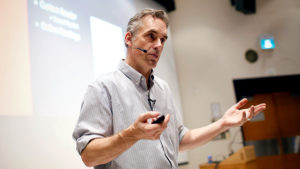On September 14, I finally had the opportunity to see Jordan Peterson speak live and in person when he did so at the Dr. Phillips Performing Arts Center in Orlando. He told us a lot that night but the biggest take away was: take responsibility for yourself. And if you’re stuck, move (not necessarily in the geographic sense). The act of moving helps you learn. And you may not move to a place you like. But it will bring you closer to moving to another place. And as you move and learn, you’ll improve your aim at the target you’re seeking. Treat yourself like you’re someone you are caring for.
It was great to experience this talk by one of the most profound philosophers of our time with some amazing friends. I had picked up his book, 12 Rules for Life a few weeks earlier. While I had listened to him on several podcasts the previous year, I had only read the introduction of the book before hearing him speak in person. But then, I dived into the rest of the book, which easily became one of the best books (of the 30) I read in 2018 – maybe the absolute best. Each chapter is dedicated to one of his 12 Rules for Life and serve as “an antidote to chaos” (the book’s subtitle). Here’s a quick synopsis of each one of his 12 Rules for Life, with excerpts from the book.
RULE 1: STAND UP STRAIGHT WITH YOUR SHOULDERS BACK
 Standing up straight with your shoulders back is not something that is only physical, because you’re not only a body. You’re a spirit, so to speak – a psyche – as well. Standing up physically also implies and invokes and demands standing up metaphysically. Standing up means voluntarily accepting the burden of Being … to stand up straight with your shoulders back is to accept the terrible responsibility of life, with eyes wide open. It means deciding to voluntarily transform the chaos of potential into the realities of habitable order … So, attend carefully to your posture. Quit drooping and hunching around. Speak your mind. Put your desires forward, as if you had a right to them – at least the same right as others. Walk tall and gaze forthrightly ahead. Dare to be dangerous. Encourage the serotonin to flow plentifully through the neural pathways desperate for it’s calming influence … Thus strengthened and emboldened, you may choose to embrace Being, and work for its furtherance and improvement.
Standing up straight with your shoulders back is not something that is only physical, because you’re not only a body. You’re a spirit, so to speak – a psyche – as well. Standing up physically also implies and invokes and demands standing up metaphysically. Standing up means voluntarily accepting the burden of Being … to stand up straight with your shoulders back is to accept the terrible responsibility of life, with eyes wide open. It means deciding to voluntarily transform the chaos of potential into the realities of habitable order … So, attend carefully to your posture. Quit drooping and hunching around. Speak your mind. Put your desires forward, as if you had a right to them – at least the same right as others. Walk tall and gaze forthrightly ahead. Dare to be dangerous. Encourage the serotonin to flow plentifully through the neural pathways desperate for it’s calming influence … Thus strengthened and emboldened, you may choose to embrace Being, and work for its furtherance and improvement.
RULE 2: TREAT YOURSELF LIKE SOMEONE YOU ARE RESPONSIBLE FOR HELPING
 You need to place one foot in what you have mastered and understood and the other in what you are currently exploring and mastering. Then you have positioned yourself where the terror of existence is under control and you are secure, but where you are also alert and engaged. That is where there is something new to master and some way that you can be improved. That is where meaning is to be found.
You need to place one foot in what you have mastered and understood and the other in what you are currently exploring and mastering. Then you have positioned yourself where the terror of existence is under control and you are secure, but where you are also alert and engaged. That is where there is something new to master and some way that you can be improved. That is where meaning is to be found.
If we wish to take care of ourselves properly, we would have to respect ourselves – but we don’t, because we are – not least in our own eyes – fallen creatures. If we lived in Truth; if we spoke the Truth – then we could walk with God once again, and respect ourselves, and others, and the world. Then we might treat ourselves like people we cared for. We might strive to set the world straight. We might orient it toward Heaven, where we would want people we cared for to dwell, instead of Hell, where our resentment and hatred would eternally sentence everyone.
RULE 3: MAKE FRIENDS WITH PEOPLE WHO WANT THE BEST FOR YOU
 Failure is easy to understand. No explanation for its existence is required. In the same manner, fear, hatred, addiction, promiscuity, betrayal and deception require no explanation. It’s not the existence of vice, or the indulgence in it, that requires explanation. Vice is easy. Failure is easy, too. It’s easier not to shoulder a burden. It’s easier not to think, and not to do, and not to care. It’s easier to put off until tomorrow what needs to be done today, or drown the upcoming months and years in today’s cheap pleasures. As the infamous father of the Simpson clan puts it, immediately prior to downing a jar of mayonnaise and vodka, ‘That’s a problem for future Homer. Man, I don’t envy that guy!’ … Success: that’s the mystery. Virtue: that’s what’s inexplicable. To fail, you merely have to cultivate a few bad habits. You just have to bide your time.
Failure is easy to understand. No explanation for its existence is required. In the same manner, fear, hatred, addiction, promiscuity, betrayal and deception require no explanation. It’s not the existence of vice, or the indulgence in it, that requires explanation. Vice is easy. Failure is easy, too. It’s easier not to shoulder a burden. It’s easier not to think, and not to do, and not to care. It’s easier to put off until tomorrow what needs to be done today, or drown the upcoming months and years in today’s cheap pleasures. As the infamous father of the Simpson clan puts it, immediately prior to downing a jar of mayonnaise and vodka, ‘That’s a problem for future Homer. Man, I don’t envy that guy!’ … Success: that’s the mystery. Virtue: that’s what’s inexplicable. To fail, you merely have to cultivate a few bad habits. You just have to bide your time.
RULE 4: WHAT YOU AIM AT DETERMINES WHAT YOU SEE
 500 small decisions, 500 tiny actions, compose your day, today, and every day. Could you aim one or two of these at a better result? … Aim small. You don’t want to shoulder too much to begin with, given your limited talents, tendency to deceive, burden of resentment, and ability to shirk responsibility. Thus, you set the following goal: by the end of the day, I want things in my life to be a tiny bit better than they were this morning. Then you ask yourself, “What could I do, that I would do, that would accomplish that, and what small thing would I like as a reward?” Then you do what you have decided to do, even if you do it badly. Then you give yourself the damn coffee, in triumph. Maybe you feel a bit stupid about it, but you do it anyway. And you do the same thing tomorrow, and the next day, and the next. And, with each day, your baseline of comparison gets a little higher, and that’s magic. That’s compound interest. Do that for three years, and your life will be entirely different. Now you’re aiming for something higher. Now you’re wishing on a star. Now the beam is disappearing from your eye, and you’re learning to see. And what you aim at determines what you see. That’s worth repeating. What you aim at determines what you see.
500 small decisions, 500 tiny actions, compose your day, today, and every day. Could you aim one or two of these at a better result? … Aim small. You don’t want to shoulder too much to begin with, given your limited talents, tendency to deceive, burden of resentment, and ability to shirk responsibility. Thus, you set the following goal: by the end of the day, I want things in my life to be a tiny bit better than they were this morning. Then you ask yourself, “What could I do, that I would do, that would accomplish that, and what small thing would I like as a reward?” Then you do what you have decided to do, even if you do it badly. Then you give yourself the damn coffee, in triumph. Maybe you feel a bit stupid about it, but you do it anyway. And you do the same thing tomorrow, and the next day, and the next. And, with each day, your baseline of comparison gets a little higher, and that’s magic. That’s compound interest. Do that for three years, and your life will be entirely different. Now you’re aiming for something higher. Now you’re wishing on a star. Now the beam is disappearing from your eye, and you’re learning to see. And what you aim at determines what you see. That’s worth repeating. What you aim at determines what you see.
RULE 5: DO NOT LET YOUR CHILDREN DO ANYTHING THAT MAKES YOU DISLIKE THEM
 Children must be shaped and informed, or they cannot thrive … Modern parents are simply paralyzed by the fear that they will no longer be liked or even loved by their children if they chastise them for any reason. They want their children’s friendship above all, and are willing to sacrifice respect to get it. This is not good. A child will have many friends, but only two parents – if that – and parents are more, not less, than friends… Parents are the arbiters of society. They teach children how to behave so that other people will be able to interact meaningfully and productively with them. It is an act of responsibility to discipline a child … Poorly socialized children have terrible lives… Clear rules make for secure children and calm, rational parents. Clear principles of discipline and punishment balance mercy and justice so that social development and psychological maturity can be optimally promoted… You love your kids, after all. If their actions make you dislike them, think what an effect they will have on other people, who care much less about them than you… Do not let your children do anything that makes you dislike them.
Children must be shaped and informed, or they cannot thrive … Modern parents are simply paralyzed by the fear that they will no longer be liked or even loved by their children if they chastise them for any reason. They want their children’s friendship above all, and are willing to sacrifice respect to get it. This is not good. A child will have many friends, but only two parents – if that – and parents are more, not less, than friends… Parents are the arbiters of society. They teach children how to behave so that other people will be able to interact meaningfully and productively with them. It is an act of responsibility to discipline a child … Poorly socialized children have terrible lives… Clear rules make for secure children and calm, rational parents. Clear principles of discipline and punishment balance mercy and justice so that social development and psychological maturity can be optimally promoted… You love your kids, after all. If their actions make you dislike them, think what an effect they will have on other people, who care much less about them than you… Do not let your children do anything that makes you dislike them.
RULE 6: SET YOUR HOUSE IN PERFECT ORDER BEFORE YOU CRITICIZE THE WORLD
 Truly terrible things happen to people. It’s no wonder they’re out for revenge. Under such conditions, vengeance seems a moral necessity … People who experience evil may certainly desire to perpetuate it, to pay it forward. But it is also possible to learn good by experiencing evil …
Truly terrible things happen to people. It’s no wonder they’re out for revenge. Under such conditions, vengeance seems a moral necessity … People who experience evil may certainly desire to perpetuate it, to pay it forward. But it is also possible to learn good by experiencing evil …
If you are suffering – well, that’s the norm. People are limited and life is tragic. If your suffering is unbearable, however, and you are starting to become corrupted, here’s something to think about… Consider your circumstances. Start small. Have you taken full advantage of opportunities offered to you? …Are you truly shouldering your responsibilities? …Have you cleaned up your life? If the answer is no, here’s something to try: Start to stop doing what you know to be wrong. Start stopping today… Do only those things that you could speak of with honour …
Your head will start to clear up, as you stop filling it with lies. Your experience will improve, as you stop distorting it with inauthentic actions. You will then begin to discover new, more subtle things that you are doing wrong. Stop doing those, too. After some months and years of diligent effort, your life will become simpler and less complicated. Your judgment will improve. You will untangle your past. You will become stronger and less bitter. You will move more confidently into the future…
Maybe your anxiety, and hopelessness, and resentment, and anger – however murderous, initially – will recede. Perhaps your uncorrupted soul will then see its existence as a genuine good, as something to celebrate, even in the face of your own vulnerability. Perhaps you will become an ever-more-powerful force for peace and whatever is good. Perhaps you will see that if all people did this, in their own lives, the world might stop being an evil place. After that, with continued effort, perhaps it could even stop being a tragic place. Who knows what existence might be like if we all decided to strive for the best? …
Set your house in perfect order before you criticize the world.
RULE 7: DO WHAT IS MEANINGFUL (NOT WHAT IS EXPEDIENT)
 Life is suffering. That’s clear … What in the world should be done about that? The simplest most obvious, and most direct answer? Pursue pleasure. Follow your impulses. Live for the moment. Do what’s expedient. Lie, cheat, steal, deceive, manipulate – but don’t get caught … The fact of life’s tragedy and the suffering that is part of it has been used to justify the pursuit of the immediate selfish gratification for a very long time.
Life is suffering. That’s clear … What in the world should be done about that? The simplest most obvious, and most direct answer? Pursue pleasure. Follow your impulses. Live for the moment. Do what’s expedient. Lie, cheat, steal, deceive, manipulate – but don’t get caught … The fact of life’s tragedy and the suffering that is part of it has been used to justify the pursuit of the immediate selfish gratification for a very long time.
Sacrifice – work – is delay of gratification … Sacrifice now, to gain later … What’s the difference between the successful and the unsuccessful? The successful sacrifice.
Aim up. Pay attention. Fix what you can fix. Don’t be arrogant in your knowledge. Strive for humility, because totalitarian pride manifests itself in intolerance, oppression, torture and death. Become aware of your own insufficiency – your cowardice, malice, resentment, and hatred. Consider the murderousness of your own spirit before you dare accuse others, and before you attempt to repair the fabric of the world. Maybe it’s not the world that’s at fault. Maybe it’s you … And above all, don’t lie. Don’t lie about anything, ever. Lying leads to Hell.
Expedience is the following of blind impulse. It’s short-term gain. It’s narrow, and selfish. It lies to get its way. It takes nothing into account. It’s immature and irresponsible. Meaning is mature replacement. Meaning emerges when impulses are regulated, organized, and unified. Meaning emerges from the interplay between the possibilities of the world and the value structure operating within that world. If the value structure is aimed at the betterment of Being, the meaning revealed will be life-sustaining. It will provide the antidote for chaos and suffering. It will make everything matter. It will make everything better … Meaning trumps expedience. Meaning gratifies all impulses, now and forever. That’s why we can detect it.
Expedience – that’s hiding all the skeletons in the closet. That’s covering the blood you just spilled with a carpet. That’s avoiding responsibility. It’s cowardly, and shallow, and wrong … expedience merely transfers the curse on your head to someone else, or to your future self, in a manner that will make your future, and the future generally, worse instead of better.
Meaning signifies that you are in the right place, at the right time, properly balanced between order and chaos, where everything lines up as best it can at that moment. What is expedient only works for the moment. It’s immediate, impulsive and limited.
Meaning is the Way, the path of life more abundant, the place you live when you are guided by Love and speaking Truth and when nothing you want or could possibly want takes any precedence over that.
Do what is meaningful, not what is expedient.
RULE 8: TELL THE TRUTH – OR, AT LEAST DON’T LIE
 Untruth, however well-meant, can produce unintended consequences .. What should you do when you don’t know what to do? Tell the truth … Taking the easy way out or telling the truth – those are not merely two different choices. They are different pathways through life. They are utterly different ways of existing.
Untruth, however well-meant, can produce unintended consequences .. What should you do when you don’t know what to do? Tell the truth … Taking the easy way out or telling the truth – those are not merely two different choices. They are different pathways through life. They are utterly different ways of existing.
Someone living a life-lie is attempting to manipulate reality with perception, thought and action, so that only some narrowly desired and pre-defined outcome is allowed to exist … Someone hiding is not someone vital. Vitality requires original contribution. Hiding also does not save the conforming and conventional from disease, insanity, death and taxes. And hiding from others also means suppressing and hiding the potentialities of the unrealized self. And that’s the problem.
If you will not reveal yourself to others, you cannot reveal yourself to yourself … When you explore boldly, when you voluntarily confront the unknown, you gather information and build your renewed self out of that information … If you betray yourself, if you say untrue things, if you act out a lie, you weaken your character.
Error necessitates sacrifice to correct it, and serious error necessitates serious sacrifice. To accept the truth means to sacrifice – and if you have rejected the truth for a long time, then you’ve run up a dangerously large sacrificial debt … An inauthentic person continues to perceive and act in ways his own experience has demonstrated false. He does not speak with his own voice.
Untruth corrupts the soul and the state alike, and one form of corruption feeds the other … With love, encouragement, and character intact, a human being can be resilient beyond imagining. What cannot be borne, however, is the absolute ruin produced by tragedy and deception.
Those who have lied enough, in word and action, live there, in hell – now.
It is deceit that makes people miserable beyond what they can bear. It is deceit that fills human souls with resentment and vengefulness. It is deceit that produces the terrible suffering of mankind.
Status you can lose. You carry character with you wherever you go, and it allows you to prevail against adversity … Live in truth or live in deceit, face the consequences, and draw your conclusions.
The little lie is, metaphorically speaking, the bait used by the Father of Lies to hook his victims … When the lie gets big enough, the whole world spoils. But if you look close enough, the biggest of lies is composed of smaller lies, and those are composed of still smaller lies – and the smallest lies is where the big lie starts … Hell comes later. Hell comes when lies have destroyed the relationship between the individual or state and reality itself .. Tortured by constant failure, the individual becomes bitter .. That’s the gateway to Hell. That’s when the underworld, a terrifying and unfamiliar place, becomes misery itself.
To tell the truth is to bring the most habitable reality into Being. Truth builds edifices that can stand a thousand years. Truth feeds and clothes the poor, and makes nations wealthy and safe. Truth reduces the terrible complexity of a man to the simplicity of his word, so that he can become a partner, rather than an enemy. Truth makes the past truly past, and makes the best use of the future’s possibilities. Truth is the ultimate, inexhaustible natural resource. It’s the light in the darkness. See the truth. Tell the truth.
If your life is not what it could be, try telling the truth. If you cling desperately to an ideology, or wallow in nihilism, try telling the truth. If you feel weak and rejected, and desperate, and confused, try telling the truth. In Paradise, everyone speaks the truth. That is what makes it Paradise.
Tell the truth, or at least, don’t lie.
RULE 9: ASSUME THAT THE PERSON YOU ARE LISTENING TO MIGHT KNOW SOMETHING YOU DON’T
 Listening is paying attention. It’s amazing what people will tell you if you listen … The people I listen to need to talk, because that’s how people think. People need to think … People think they think, but it’s not true. It’s mostly self-criticism that passes for thinking. True thinking is rare – just like true listening. Thinking is listening to yourself. It’s difficult. To think, you have to be at least two people at the same time. Then you have to let those people disagree. Thinking is an internal dialogue between two or more different views of the world.
Listening is paying attention. It’s amazing what people will tell you if you listen … The people I listen to need to talk, because that’s how people think. People need to think … People think they think, but it’s not true. It’s mostly self-criticism that passes for thinking. True thinking is rare – just like true listening. Thinking is listening to yourself. It’s difficult. To think, you have to be at least two people at the same time. Then you have to let those people disagree. Thinking is an internal dialogue between two or more different views of the world.
True thinking is complex and demanding. It requires you to be articulate speaker and careful, judicious listener, at the same time. It involves conflict. You have to tolerate conflict.
A listening person tests your talking (and your thinking) without having to say anything. A listening person is a representative of common humanity. He stands for the crowd. Now the crowd is by no means always right, but it’s commonly right. It’s typically right. If you say something that takes everyone aback, therefore, you should reconsider what you said … A little gratitude might be in order. If you’re going to insist on bending the world to your way, you better have your reasons. If you’re going to stand your ground, you better have your reasons. You better have thought them through. You might otherwise be in for a very hard landing.
You have to get along with other people. A therapist is one of those other people. A good therapist will tell you the truth about what he thinks (That is not the same thing as telling you that what he thinks is the truth). Then at least you have the honest opinion of at least one person. That’s not so easy to get. That’s not nothing. That’s key to the psychotherapeutic process: two people tell each other the truth – and both listen.
How do you listen? Carl Rogers suggested that his readers conduct a short experiment when they next found themselves in a dispute: Stop the discussion for a moment, and institute this rule: Each person can speak up for himself only after he has first restated the ideas and feelings of the previous speaker accurately, and to that speaker’s satisfaction … If you really understand a person in this way, if you are willing to enter his private world and see the way life appears to him, you run the risk of being changed yourself … The risk of being changed is one of the most frightening prospects most of us can face.
The final type of conversation, akin to listening, is a form of mutual exploration. It requires true reciprocity on the part of those listening and speaking … Everyone participating is trying to solve a problem, instead of insisting on the a priori validity of their own positions. All are acting on the premise that they have something to learn … The conversation of mutual exploration requires people who have decided that the unknown makes a better friend than the known. You already know what you know, after all – and, unless your life is perfect, what you know is not enough … It’s as though you are listening to yourself during such a conversation, just as you are listening to the other person … A conversation such as this is one where it is the desire for truth itself – on the part of both participants – that is truly listening and speaking.
Assume that the person you are listening to might know something you don’t.
RULE 10: BE PRECISE IN YOUR SPEECH
 Chaos emerges in a household, bit by bit. Mutual unhappiness and resentment pile up. Everything untidy is swept under the rug … but not thinking about something you don’t want to know about doesn’t make it go away … Why refuse to specify, when specifying the problem would enable its solution? Because to specify the problem admits that it exists … Maybe you’ll get hurt, probably you’ll get hurt. Life after all, is suffering. But maybe the wound won’t be fatal … you will learn something from that, and use what you learn in the future – and the alternative to that single sharp pain is the dull ache of continued hopelessness and vague failure and the sense that time, precious time, is slipping by.
Chaos emerges in a household, bit by bit. Mutual unhappiness and resentment pile up. Everything untidy is swept under the rug … but not thinking about something you don’t want to know about doesn’t make it go away … Why refuse to specify, when specifying the problem would enable its solution? Because to specify the problem admits that it exists … Maybe you’ll get hurt, probably you’ll get hurt. Life after all, is suffering. But maybe the wound won’t be fatal … you will learn something from that, and use what you learn in the future – and the alternative to that single sharp pain is the dull ache of continued hopelessness and vague failure and the sense that time, precious time, is slipping by.
When things fall apart, and chaos re-emerges, we can give structure to it, and re-establish order, through our speech. If we speak carefully and precisely, we can sort things out, and put them in their proper place, and set a new goal, and navigate to it – often communally, if we negotiate; if we reach consensus. If we speak carelessly and imprecisely, however, things remain vague. The destination remains unproclaimed … Precision specifies … Precision may leave the tragedy intact, but it chases away the ghouls and demons … even what is terrible in actuality often pales in significance compared to what is terrible in imagination … Don’t hide the baby monsters under the carpet. They will flourish. They will grow in the dark. Then, when you least expect it, they will jump out and devour you.
You must speak forthrightly and call forth the habitable world from chaos. You must use honest precise speech to do that … You must determine where you have been in your life, so that you can know where you are now …because otherwise you can’t get to where you are going… Then pay attention. Note your errors. Articulate them. Strive to correct them. That is how you discover the meaning of your life … Confront the chaos of Being. Take aim against a sea of troubles. Specify your destination, and chart your course. Admit to what you want. Tell those around you who you are. Narrow, and gaze attentively, and move forward, forthrightly.
Be precise in your speech.
RULE 11: DO NOT BOTHER CHILDREN WHEN THEY ARE SKATEBOARDING
 When playgrounds are made too safe, kids either stop playing in them or start playing in unintended ways. Kids need playgrounds dangerous enough to remain challenging. People, including children, don’t seek to minimize risk. They seek to optimize it. They drive and walk and love and play so that they achieve what they desire, but they push themselves a bit at the same time, too, so they continue to develop … we prefer to live on the edge. There, we can still be both confident in our experience and confronting the chaos that helps us develop.
When playgrounds are made too safe, kids either stop playing in them or start playing in unintended ways. Kids need playgrounds dangerous enough to remain challenging. People, including children, don’t seek to minimize risk. They seek to optimize it. They drive and walk and love and play so that they achieve what they desire, but they push themselves a bit at the same time, too, so they continue to develop … we prefer to live on the edge. There, we can still be both confident in our experience and confronting the chaos that helps us develop.
Men have to toughen up. Men demand it, and women want it … Men toughen up by pushing themselves, and by pushing each other … If they’re healthy, women don’t want boys. They want men. They want someone to contend with; someone to grapple with. If they’re tough, they want someone tougher. If they’re smart, they want someone smarter. They desire someone who brings to the table something they can’t already provide. This often makes it hard for tough, smart, attractive women to find mates: there just aren’t that many men around who can outclass them enough to be considered desirable.
The spirit that interferes when boys are trying to become men is, therefore, no more friend to a woman than it is to a man. It will object, just as vociferously and self-righteously when little girls try to stand on their own two feet. It negates consciousness. It’s antihuman, desirous of failure, jealous, resentful and destructive. No one truly on the side of humanity would ally him or herself with such a thing. No one aiming at moving up would allow him or herself to become possessed by such a thing. And if you think tough men are dangerous, wait until you see what weak men are capable of.
Leave children alone when they are skateboarding.
RULE 12: PET A CAT WHEN YOU ENCOUNTER ONE ON THE STREET
 The idea that life is suffering is a tenet, in one form or another, of every major religious doctrine .. Buddhists state it directly. Christians illustrate it with the cross. Jews commemorate the suffering endured over centuries. Such reasoning universally characterizes the great creeds, because human beings are intrinsically fragile. We can be damaged, even broken, emotionally and physically, and we are all subject to the depredations of aging and loss.
The idea that life is suffering is a tenet, in one form or another, of every major religious doctrine .. Buddhists state it directly. Christians illustrate it with the cross. Jews commemorate the suffering endured over centuries. Such reasoning universally characterizes the great creeds, because human beings are intrinsically fragile. We can be damaged, even broken, emotionally and physically, and we are all subject to the depredations of aging and loss.
What can be truly about a person is inseparable from their limitations … there’s something to be said for recognizing that existence and limitation are inextricably linked … a superhero who can do anything turns out to be no hero at all. He’s nothing specific, so he’s nothing. He has nothing to strive against, so he can’t be admirable. Being of any reasonable sort appears to require limitation. Perhaps this is because Being requires Becoming, perhaps as well as mere existence – and to become is to become something more, or at least something different. That is only possible for something limited.
Be careful. Put the things you control in order. Repair what is in disorder, and make what is already good better. It is possible that you can manage, if you are careful. People are very tough. People can survive through much pain and loss. But to persevere they must see the good in Being. If they lose that, they are truly lost.
If you pay careful attention, even on a bad day, you may be fortunate enough to be confronted with small opportunities … Maybe you will see a little girl dancing on the street … maybe you will have a particularly good cup of coffee in a café that cares about its customers. Maybe you can steal ten or twenty minutes to do some little ridiculous thing of existence … and maybe when you are going for a walk and your head is spinning a cat will show up and if you pay attention to it then you will get a reminder for just fifteen seconds that the wonder of Being might make up for the ineradicable suffering that accompanies it.
Pet a cat when you encounter one on the street.

